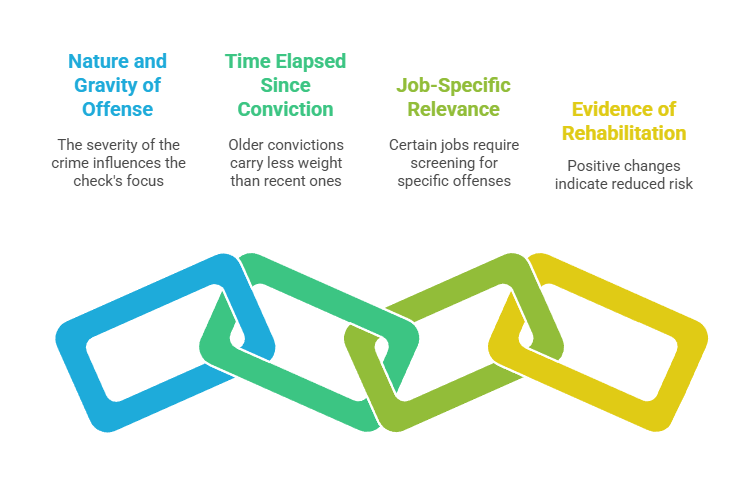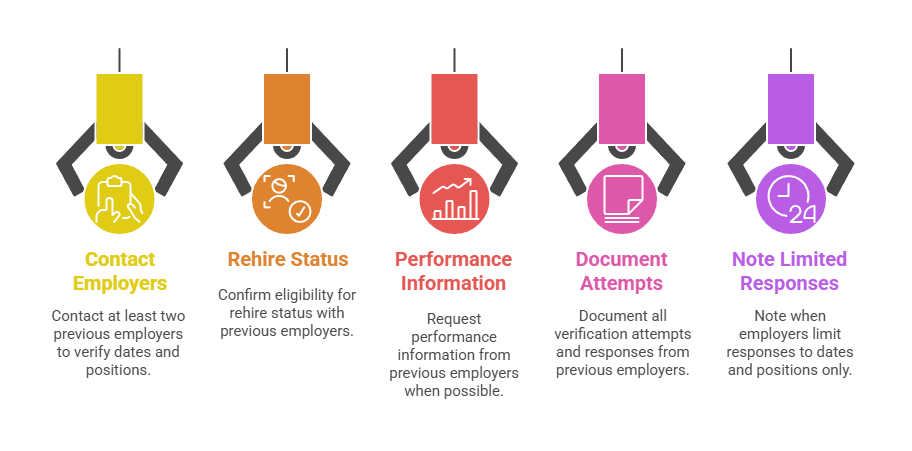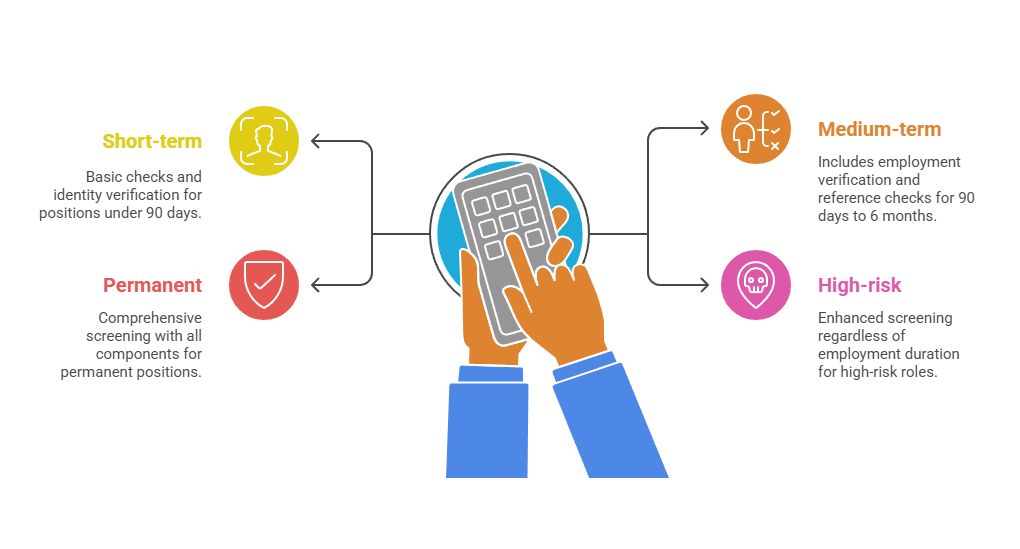Colorado construction companies face a unique regulatory environment that requires balancing thorough background screening with fair hiring practices mandated by the Chance to Compete Act. This guide addresses the complex intersection of federal FCRA requirements, state-level fair chance laws, and construction industry best practices to help employers implement compliant and effective pre-employment screening processes.
Key Takeaways
- Colorado's Chance to Compete Act restricts when employers can inquire about criminal history, requiring construction companies to delay background checks until after conditional job offers in most cases.
- Construction industry background checks in Colorado must comply with both federal FCRA regulations and state-specific requirements, including proper disclosure, authorization, and adverse action procedures.
- Denver construction employee background checks should include verification of trade licenses, OSHA safety certifications, and drug screening that accounts for Colorado's recreational cannabis laws while maintaining workplace safety standards.
- Specialized construction projects such as cannabis facility builds, government contracts, and mountain region developments may require enhanced screening protocols beyond standard construction background check requirements.
- The seven-year reporting limitation under Colorado law restricts most criminal records from appearing on background checks, though exceptions exist for positions paying over $75,000 annually.
- Construction companies must implement individualized assessment procedures when evaluating criminal history, considering the nature of the offense, time elapsed, and job-specific relevance before making hiring decisions.
- Pre-employment screening processes should verify workers' legal right to work, previous employment history, education credentials for specialized trades, and professional references to ensure workforce quality and project safety.
- Third-party background screening providers must maintain FCRA compliance, provide dispute resolution mechanisms, and deliver accurate reporting to protect both employers and applicants from legal liability.
Understanding Colorado Construction Background Screening Regulations
Colorado's construction industry operates within a distinctive legal framework that significantly impacts how employers conduct background screening. The state has implemented progressive fair chance hiring legislation while maintaining rigorous safety standards essential for construction environments. Understanding these regulations is fundamental for HR managers and operations directors responsible for building compliant hiring processes.
The Chance to Compete Act and Its Impact on Construction Hiring
Colorado's Chance to Compete Act, effective since September 2021, fundamentally changed when and how construction employers can inquire about criminal history. This legislation prohibits employers from asking about criminal records on initial job applications. It generally requires companies to extend conditional job offers before conducting criminal background checks.
The Act includes specific exceptions that construction employers should understand. Most general construction positions fall under standard requirements. However, certain roles have different rules. Construction companies must revise application forms, train hiring managers on compliant interview practices, and restructure their screening timelines to align with these fair chance requirements.
Federal FCRA Requirements for Construction Employers
The Fair Credit Reporting Act establishes the federal baseline for all background screening activities, including those in the construction industry. FCRA compliance requires construction companies to provide clear written disclosure to applicants before obtaining background reports. Employers must also secure separate written authorization. Additionally, they must follow specific adverse action procedures if screening results lead to employment decisions.
Construction employers must be particularly attentive to FCRA's adverse action process. Before declining to hire based on background check findings, employers must provide pre-adverse action notice. This notice includes a copy of the report and a summary of rights. Employers must then wait a reasonable period—typically 5-7 business days—before taking final action. This waiting period allows applicants to dispute inaccurate information, which is critical given that background check errors occur in approximately 30% of reports according to Federal Trade Commission studies.
Seven-Year Reporting Limitations in Colorado
Colorado law restricts the reporting of most criminal convictions beyond seven years. This limitation applies to criminal records, civil suits, civil judgments, records of arrest, tax liens, and accounts placed for collection. For construction companies conducting background checks, this means older offenses generally won't appear on screening reports.
Important exceptions exist that construction employers should understand. Positions with annual compensation of $75,000 or more are exempt from the seven-year limit. This means executive construction roles, senior project managers, and specialized trade positions may reveal older records. Additionally, this restriction applies to reporting by consumer reporting agencies but doesn't prevent applicants from voluntarily disclosing older history.
Essential Components of Colorado Construction Background Checks
Comprehensive background screening for construction positions involves multiple verification components tailored to industry-specific risks. Construction companies must balance thoroughness with efficiency. The goal is to identify potential safety risks and verify qualifications without creating unnecessary hiring delays.
Criminal History Screening and Individualized Assessment
Criminal background checks remain central to construction pre-employment screening, though Colorado law requires thoughtful evaluation rather than blanket exclusions. Construction employers must conduct individualized assessments when criminal history appears. The evaluation should consider several key factors:

- Nature and gravity of the offense: Violent crimes warrant different consideration than minor offenses.
- Time elapsed since conviction: A decade-old conviction should receive different weight than a recent one.
- Job-specific relevance: Equipment operators might be excluded for DUI convictions, while positions with building access during renovations might warrant screening for burglary or trespassing.
- Evidence of rehabilitation: Completed programs, stable employment history, and character references demonstrate positive change.
The Equal Employment Opportunity Commission guidelines reinforce this individualized approach. Construction companies should develop clear policies that identify which specific offenses relate directly to job duties. Documentation of the decision-making process provides important legal protection if hiring decisions are later challenged.
Professional License and Certification Verification
Colorado requires licensure for numerous construction trades, making verification of these credentials essential to legal compliance. Electricians, plumbers, and HVAC technicians must hold active licenses issued by the Colorado Department of Regulatory Agencies. Construction background screening should verify that applicants possess current, valid licenses for their claimed specializations.
| License/Certification Type | Verification Method | Typical Turnaround |
| State Trade Licenses | Direct verification with DORA | 1-2 business days |
| OSHA Safety Certifications | Contact issuing training provider | 2-3 business days |
| Equipment Operation Credentials | Verify with certification body | 1-3 business days |
| Specialized Safety Training | Request certification copies + verification | 3-5 business days |
Beyond state licensure, many construction positions require industry certifications demonstrating safety training and specialized competencies. Given that fraudulent credentials occasionally appear in the construction industry, direct verification with issuing organizations provides stronger assurance than simply reviewing certificates presented by applicants.
Drug Screening and Cannabis Considerations
Drug screening presents unique challenges for Colorado construction employers operating in a state with legalized recreational cannabis. Construction companies must maintain drug-free workplaces to comply with federal Department of Transportation regulations for commercial drivers. They also need to satisfy insurance requirements and ensure job site safety where heavy equipment and elevated work create serious injury risks.
Construction employers should implement clear drug and alcohol policies that emphasize safety-sensitive positions. Pre-employment drug screening remains legal and common in the construction industry. Most companies test for marijuana alongside other controlled substances. Importantly, employers can still prohibit workplace impairment and take action against employees who work under the influence. Partnering with certified collection facilities and SAMHSA-certified laboratories ensures testing accuracy and legal defensibility.
Denver Construction Employee Background Check Best Practices
Denver's robust construction market, driven by continued urban development and infrastructure projects, requires employers to implement efficient yet thorough screening processes. The competitive labor market means construction companies must balance comprehensive due diligence with streamlined procedures. Slow screening processes can lose qualified candidates to faster-hiring competitors.
Identity and Employment Verification
Accurate identity verification forms the foundation of reliable background screening. Construction employers must verify that applicants are who they claim to be through government-issued identification. They must also complete Form I-9 employment eligibility verification as required by federal immigration law. Given construction industry challenges with document fraud and identity theft, many Denver employers supplement basic I-9 verification with E-Verify.
Previous employment verification provides critical insights into applicants' work history, reliability, and performance. Construction employers should implement a systematic approach:

Given the transient nature of construction work and the prevalence of short-term project-based employment, verifying construction-specific experience helps confirm practical skills. Documentation of verification attempts protects employers if discrepancies later emerge.
Reference Checks and Professional Reputation
Professional reference checks offer qualitative insights that criminal records and credential verification cannot provide. Speaking directly with supervisors who've overseen an applicant's construction work reveals information about work ethic, reliability, and safety consciousness. Given construction's emphasis on job site safety and team coordination, these behavioral insights prove particularly valuable for predicting job performance.
Construction employers should prepare structured reference check questions that probe job-relevant competencies. Questions should focus on safety response, attendance reliability, and teamwork effectiveness. Structured questions yield more consistent, comparable information across candidates while helping employers avoid questions that might elicit protected class information.
Specialized Construction Background Screening Requirements
Certain construction projects and specialized positions require enhanced screening protocols beyond standard background checks. Understanding these elevated requirements helps construction companies bid appropriately on specialized projects. It also ensures they maintain compliance with sector-specific regulations.
Cannabis Facility Construction Projects
Colorado's established cannabis industry requires ongoing construction for cultivation facilities, dispensaries, and processing centers. These projects come with unique background screening requirements. The Colorado Marijuana Enforcement Division mandates background checks for individuals with access to cannabis facilities. This includes construction workers performing build-outs or renovations. These checks are more comprehensive than standard construction screening and typically include FBI fingerprint-based checks.
Construction companies bidding on cannabis facility projects should build enhanced screening costs and timelines into their proposals. The fingerprint-based background checks take longer than standard name-based searches. They also involve additional fees. Certain criminal convictions—particularly drug-related offenses—create disqualifications for cannabis facility access that wouldn't necessarily prevent employment on standard construction projects.
Government Contract and Public Works Projects
Construction companies working on government contracts and public works projects face additional screening requirements under federal and state regulations. The Public Buildings Service requires background checks for contractor personnel working in federal facilities. Requirements vary based on security level and access type. Colorado state projects may impose similar requirements, particularly for construction on sensitive facilities.
| Project Type | Screening Requirements | Special Considerations |
| Federal Buildings | FBI fingerprint checks, security clearances | 4-6 week processing times |
| State Facilities | Colorado Bureau of Investigation checks | Varies by facility type |
| Public Works | Prevailing wage verification, license checks | Davis-Bacon Act compliance |
| Military Installations | Enhanced security screening | Additional clearance levels |
Prevailing wage verification and contractor licensing compliance receive heightened scrutiny on public works projects. Background screening for public works should document workers' trade qualifications and apprenticeship status where applicable. This ensures proper classification to avoid violations that can result in debarment from future public projects.
High-Altitude and Mountain Construction Projects
Colorado's mountain construction projects present unique safety considerations that inform screening priorities. Construction work at elevations above 8,000 feet introduces physiological challenges including altitude sickness and reduced oxygen availability. While background checks don't directly screen for altitude tolerance, verifying previous high-altitude construction experience and specialized training becomes particularly relevant.
Mountain construction projects often involve extended periods in remote locations with limited supervision. This increases the importance of thorough reference checks that probe self-direction and judgment. Screening should also verify qualifications for specialized equipment required in mountain environments. Construction companies regularly performing mountain work benefit from developing screening protocols specifically tailored to these unique operational challenges.
Implementing Compliant Background Screening Processes

Establishing systematic, compliant background screening procedures protects construction companies from legal liability while ensuring consistent, fair candidate evaluation. Well-designed processes also improve efficiency and reduce time-to-hire. They create positive candidate experiences that strengthen employer branding in competitive labor markets.
Selecting Background Screening Providers
Most Colorado construction companies partner with third-party consumer reporting agencies for background screening rather than conducting checks internally. Selecting the right provider requires evaluating several factors. These include FCRA compliance track record, construction industry experience, and screening comprehensiveness. Turnaround times, technology integration capabilities, and cost structure also matter. The National Association of Professional Background Screeners accreditation indicates providers meet industry standards.
Construction-specific background screening needs should inform provider selection. Providers with construction industry experience understand sector-specific needs and design services accordingly. Key questions to ask include:
- Multi-state capabilities: Can they verify trade licenses across multiple states?
- Volume handling: Can they process high volumes during seasonal hiring surges?
- Technology access: Do they offer mobile-friendly application processes for candidates?
- Industry references: Can they provide references from other construction companies?
Requesting references from other construction companies and conducting trial runs with small candidate batches helps evaluate providers. This testing occurs before committing to long-term contracts.
Establishing Screening Timelines and Workflows
Efficient workflow design minimizes time between conditional job offers and final hiring decisions. This is critical in construction where project start dates create urgency. Construction companies should map their entire screening process from authorization to final decision. Identifying bottlenecks and establishing clear responsibility assignments prevents delays.
Technology integration streamlines screening workflows significantly. Applicant tracking systems that connect directly with background screening providers enable one-click check ordering. They also provide automatic status updates and centralized result storage. Automated adverse action letter generation ensures FCRA compliance while reducing administrative burden. For construction companies hiring dozens or hundreds of workers annually, these efficiency improvements create substantial time savings.
Training Hiring Managers and Supervisors
Even the most carefully designed background screening policies fail without proper implementation by hiring managers and supervisors. Construction companies should provide regular training covering the Chance to Compete Act's restrictions on criminal history inquiries. Training should also address FCRA requirements, proper adverse action procedures, and individualized assessment protocols. Role-playing exercises help managers practice compliant interview techniques.
Training should emphasize documentation requirements that protect both the company and individual managers from discrimination claims. Hiring managers should understand which screening criteria are job-related and legally defensible versus which create potential disparate impact concerns. Annual refresher training and updates when regulations change maintain compliance awareness across the organization.
Cost Considerations and ROI of Background Screening
Background screening represents a significant investment for construction companies, particularly those experiencing high turnover or rapid growth. Understanding cost structures and calculating return on investment helps construction executives make informed decisions. This analysis guides choices about screening comprehensiveness and budget allocation.
Background Screening Cost Factors
Construction background check costs vary based on comprehensiveness, turnaround speed, and volume. Basic criminal record checks typically range from $20-$50 per candidate. Comprehensive screening packages including employment verification, license checks, drug testing, and motor vehicle records may cost $100-$300 per candidate. Rush processing for urgent hires generally adds 25-50% to standard pricing.
Beyond direct screening fees, internal administrative costs deserve consideration. Staff time for processing authorizations, reviewing results, and conducting individualized assessments represents real expense. Technology investments in applicant tracking systems and background screening integrations create upfront costs but reduce ongoing administrative burden. Construction companies should calculate total cost of ownership when evaluating screening approaches.
Quantifying Background Screening Value
Background screening delivers measurable value through several mechanisms that construction companies can quantify. Reduced workplace incidents translate directly to lower workers' compensation premiums. Avoiding negligent hiring liability protects companies from costly litigation. Negligent hiring judgments average over $1 million according to insurance industry data. Preventing theft, fraud, and property damage by screening out high-risk candidates delivers additional savings.
Quality of hire improvements provide less tangible but equally important value:
- Better performance: Workers who accurately represent qualifications typically perform better
- Longer tenure: Reduced turnover saves recruiting and training costs
- Less supervision: Honest employees require less oversight and correction
- Project continuity: Stable workforces improve project timelines and quality
Though difficult to measure precisely, construction companies often estimate that preventing a single bad hire's costs justifies screening expenses for 10-20 successful hires. This demonstrates a strong return on investment.
Addressing Common Colorado Construction Screening Challenges
Construction companies implementing background screening programs encounter recurring challenges specific to the industry's unique characteristics. Anticipating these obstacles and developing proactive solutions prevents screening from becoming a hiring bottleneck. Effective problem-solving maintains both compliance and operational efficiency.
Managing Screening for Seasonal and Temporary Workers
Colorado's construction industry experiences significant seasonal fluctuation. Companies rapidly scale up for summer construction seasons and reduce crews during winter months. This pattern creates screening challenges around processing high volumes during compressed timeframes. It also raises questions about maintaining screening consistency and determining appropriate screening depth for short-term positions.
Construction companies should establish on-demand relationships with background screening providers that can flex capacity during peak hiring periods. Screening protocols for temporary positions might appropriately differ from permanent hire screening. Some construction companies implement tiered screening:

- Short-term positions (under 90 days): Basic criminal checks and identity verification
- Medium-term positions (90 days to 6 months): Add employment verification and reference checks
- Permanent positions: Comprehensive screening including all components
- High-risk roles: Enhanced screening regardless of employment duration
This risk-based approach balances safety and compliance with practical hiring speed requirements. It also controls costs during high-volume hiring periods.
Handling Gaps in Work History and Informal Construction Experience
Construction workers frequently have employment gaps due to the project-based nature of work, seasonal patterns, and industry cyclicality. Screening processes designed for traditional employment may flag these gaps as concerns when they actually represent normal industry patterns. Background screeners should be trained to understand construction employment norms. The focus should be on confirming the accuracy of claimed experience rather than penalizing typical industry work patterns.
Many skilled construction workers gained experience through informal channels. This includes working for small contractors who are no longer in business or family construction businesses. Construction companies should develop alternative verification approaches for these situations. Requesting project portfolios that demonstrate work quality helps. Contacting trade schools or apprenticeship programs where applicants are trained provides verification. Conducting practical skills assessments that directly evaluate construction competencies works regardless of how workers acquired them.
Conclusion
Colorado construction worker background screening requires navigating complex intersections of federal FCRA requirements, state fair chance hiring laws, and industry-specific safety considerations. By implementing compliant screening processes that include appropriate criminal history evaluation, credential verification, and drug testing while respecting applicant rights under the Chance to Compete Act, construction companies protect themselves legally while building qualified, safe workforces. The investment in comprehensive background screening delivers measurable returns through reduced liability exposure, improved workplace safety, and higher-quality hires who contribute to project success. As regulatory requirements continue evolving, partnering with experienced screening providers and maintaining current compliance knowledge positions construction companies for sustained success in Colorado's dynamic building environment.
Frequently Asked Questions
What does the Colorado Chance to Compete Act require for construction background checks?
The Chance to Compete Act prohibits Colorado construction employers from inquiring about criminal history on initial applications and generally requires extending conditional job offers before conducting criminal background checks. Employers must evaluate any discovered criminal history through individualized assessment considering offense nature, time elapsed, and job relevance rather than applying blanket exclusion policies. The Act includes exceptions for positions requiring background checks by law and roles with unsupervised access to vulnerable populations.
How long do construction background checks take in Colorado?
Standard Colorado construction background checks typically take 3-5 business days, though timelines vary based on screening components and jurisdictions searched. Criminal record searches in counties with electronic systems return results within 1-2 days, while manual courthouse searches may take 5-7 days. Adding employment verification, license checks, and drug screening extends timelines to 5-10 business days. Fingerprint-based FBI checks required for cannabis facility construction projects take 2-4 weeks.
Can Colorado construction employers reject applicants with criminal records?
Colorado construction employers may consider criminal history but must conduct individualized assessments rather than automatic disqualifications. Employers should evaluate whether specific offenses relate directly to job duties, consider time elapsed since convictions, and assess evidence of rehabilitation. Construction companies should document their assessment process and business justification when criminal history influences hiring decisions to defend against potential discrimination claims.
Are drug tests required for construction workers in Colorado?
Colorado law doesn't mandate drug testing for construction positions, but most construction employers conduct pre-employment drug screening to maintain workplace safety and satisfy insurance requirements. While recreational cannabis is legal in Colorado, construction employers can establish drug-free workplace policies and prohibit on-duty impairment. Safety-sensitive construction positions particularly warrant drug testing given inherent hazards associated with heavy equipment, elevated work, and power tools.
What criminal offenses disqualify construction workers in Colorado?
No specific Colorado law automatically disqualifies construction workers based on criminal history categories. Construction employers should identify job-related offenses based on specific position requirements—for example, theft convictions for roles with tool access or DUI convictions for positions requiring company vehicle operation. Recent offenses and patterns of repeat violations typically receive greater weight than isolated older incidents.
Do construction companies need FCRA compliance for background checks?
Yes, construction companies must comply with the federal Fair Credit Reporting Act when obtaining background checks from consumer reporting agencies. FCRA requires employers to provide clear written disclosure before screening, obtain separate written authorization, and follow specific adverse action procedures if background check results lead to negative employment decisions. These requirements apply regardless of company size and whether using third-party screening providers.
How much do construction background checks cost in Colorado?
Colorado construction background check costs range from $20-$50 for basic criminal record searches to $100-$300 for comprehensive screening packages including employment verification, credential checks, drug testing, and motor vehicle records. Costs vary based on screening depth, turnaround speed, and geographic scope. Construction companies with high hiring volumes typically negotiate discounted per-check pricing.
What should construction companies verify besides criminal history?
Comprehensive construction background screening should verify professional licenses and certifications required for specific trades, OSHA safety training credentials, employment history with previous construction employers, and references from construction supervisors. Identity and work authorization through I-9 and E-Verify, motor vehicle records for positions requiring driving, and drug screening for safety-sensitive roles are also essential components.
Additional Resources
- Colorado Chance to Compete Act - Official Information
https://cdle.colorado.gov/laws-regulations-guidance - Federal Trade Commission - Fair Credit Reporting Act Guidance
https://www.ftc.gov/legal-library/browse/statutes/fair-credit-reporting-act - Colorado Department of Regulatory Agencies - Professional Licenses
https://dpo.colorado.gov/ - EEOC Guidance on Criminal Records in Employment
https://www.eeoc.gov/laws/guidance/arrest-and-conviction-records - National Association of Professional Background Screeners
https://www.napbs.com/ - Colorado Marijuana Enforcement Division - Construction Requirements
https://sbg.colorado.gov/med - OSHA Construction Industry Safety Resources
https://www.osha.gov/construction
